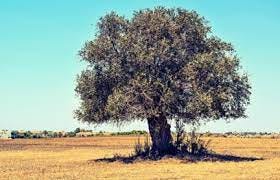This has been a momentous week for my larger family network. My eldest niece, born when I was preparing to head off to college back in 2005, decided where she will be spending her college years. My eldest nephew, Isaiah, will be celebrating becoming a Bar Mitzvah this Shabbat on the same portion that I was Bar Mitzvah’d. And Cal, my son, had his 6 month visit (which went great!), tried his first foods, and is doing all sorts of fun new tricks around the house.
Sunrise, sunset, or something. I still haven’t seen all of Fiddler on The Roof. Nonetheless, all of these transitions have gotten me a bit misty eyed and thinking about the lessons we teach our young folks, those that have just started and those that are getting ready to launch into new stages.
Interestingly, one of the portions we’re reading this week hints at this as well. We are introduced to the concept of orlah in Leviticus 19:23-25:
When you enter the land and plant any tree for food, you shall regard its fruit as forbidden. Three years it shall be forbidden for you, not to be eaten. In the fourth year all its fruit shall be set aside for jubilation before יהוה; and only in the fifth year may you use its fruit—that its yield to you may be increased: I יהוה am your God.
As a method of inculcating an attitude of gratitude, selflessness, and patience among this new nation, the Torah forbids the use of fruit trees within the first three years of their lives. In the fourth year, a part of it is set aside for God. Then, only in the fifth year would you get to enjoy it.
It’s a fairly straightforward concept and one that, I believe, seems fairly smart. If you’re just figuring out what it means to be an individual and community in a new land, it’s best to learn some self-restraint. After all, as the Prophets say, you can’t always get what you want.
The Rabbis in the Midrash (Tanchuma) take it in a different direction:
And plant any fruit-bearing tree, you shall leave its fruit uncircumcised - This verse speaks of children. For three years they shall be for you as if they are [symbolically,] uncircumcised, namely, they are unable to converse and express themselves. And in the fourth year, all its fruit shall be sacred – the children’s parents should dedicate their children to Torah study. A jubilation to the Lord – What is the nature of the jubilation? The children are then dedicated to the Holy One[since this is the age when a child’s formal education begins.] And in the fifth year you may eats its fruit – from this age on the child is obligated to study Torah. And from this time forward, the child’s parents reap the reward of the harvest [namely, the children’s education].
Instead of this being about trees, it becomes a series of verses about children. In the early parts of their life, and the Rabbis take some license here, they can’t be utilized. Then, they begin to learn what it means to be Jewish, learning texts, rituals, and traditions. Finally, they begin the process of owning their own education, becoming empowered in their Judaism. In doing so, those around them reap the benefits.
It’s a beautiful framing. By taking something a bit outdated and inaccessible for some, this Midrash recalibrates this message into something universal: the need to steep our youngest in lessons from our tradition.
Those lessons are vast and diverse, which is part of the beauty of it all. There is much with which to connect. As I thought about my niece and nephew and their transitions in life and my own son’s, I came across a powerful one, also from this week’s portion1:
לֹֽא־תַעֲשֹׁ֥ק אֶת־רֵֽעֲךָ֖ וְלֹ֣א תִגְזֹ֑ל לֹֽא־תָלִ֞ין פְּעֻלַּ֥ת שָׂכִ֛יר אִתְּךָ֖ עַד־בֹּֽקֶר׃
You shall not defraud your fellow [Israelite]. You shall not commit robbery. The wages of a laborer shall not remain with you until morning.
A fairly obvious directive is listed. Don’t defraud people. Seems simple, right? As we have discussed here, when something simple presents itself, leave it to the Chasidic masters to take it another direction.
On this notion of defrauding, we have this text from the Mei Hashiloach, the Ishbitzer who says the following:
היינו כל דבר טוב שיוכל האדם להמציא לחבירו ולא ימציא לו נקרא עושק אותו. ואף תפלה שיכול האדם להתפלל אל ה' בעד חבירו ולא מתפלל בעדו נקרא עושק אותו
Any time when one could provide something good for his fellow but does not, he is defrauding her. Even when he has the opportunity to pray for his fellow, but does not, this too is called defrauding her.
In other words, in this section of the Torah that is often called the holiness code, we are learning about what it means to be in holy relationship with others. In this particular instance, we think we’re reading about how to be in a business relationship with someone. Don’t defraud them.
The Mei Hashiloach says no, this is about being in any relationship with anyone. If you want to truly be an upstanding person in the world, lift up the people around you. Wish them good things, even if it comes at your expense or even if they may have wronged you. Do right by others. Otherwise, you’ve become a hater and a fraud.
So as I think about Cal, Noa, and Isaiah, I would offer them the same words. Whether you’re six months and starting to crawl, thirteen and starting to dream, or eighteen and starting to live, this is a good tenet upon which to live your life. Steep yourself in “learning.” Surround yourself with people that you love. Elevate them as much as you can. Then, reap the rewards.
Shabbat Shalom and Happy Weekend!
Leviticus 19:13

